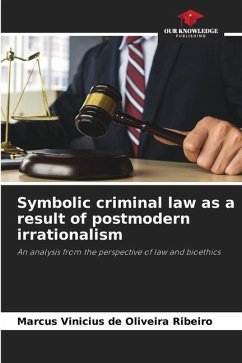This paper presents symbolic criminal law as a phenomenon that arises from the feeling of urgency that society expresses towards the state when the former thinks that the application of criminal rules is undue, given the few policies to prevent crime. It shows the consequences of undesirable side-effects for crime, violence and the entire social framework in which these two elements are generally inserted. In practice, its appearance can be summed up as a propagandistic, manipulative wave, generally aimed at the popular masses, with symbolism emerging through the enactment of laws in response to public outcry every time a crime shocks the country. This symbolism is often used as a tool by political opportunists for their own benefit, turning it into a dangerous weapon, resulting from the crisis of reason in contemporary Brazilian society, the so-called Post-Modern Irrationalism.
Bitte wählen Sie Ihr Anliegen aus.
Rechnungen
Retourenschein anfordern
Bestellstatus
Storno








